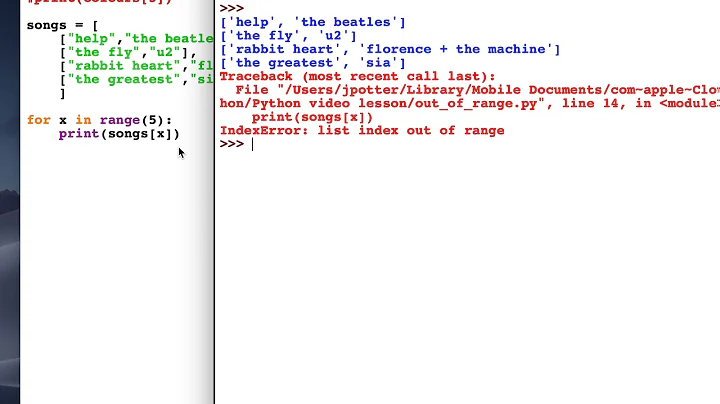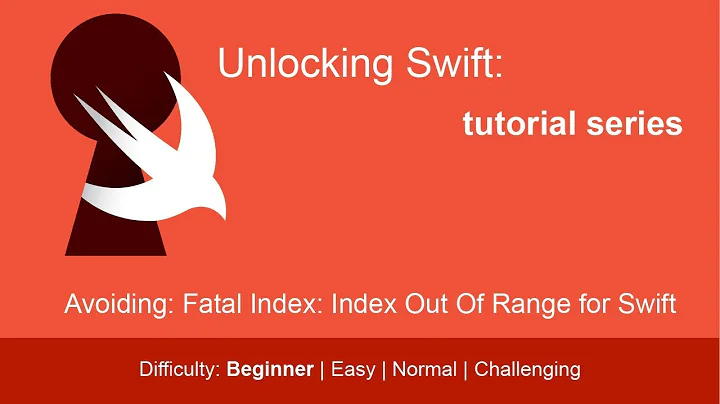Pop index out of range
Solution 1
To get the final value of a list pop'ed, you can do it this way:
>>> l=range(8)
>>> l
[0, 1, 2, 3, 4, 5, 6, 7]
>>> l.pop(4) # item at index 4
4
>>> l
[0, 1, 2, 3, 5, 6, 7]
>>> l.pop(-1) # item at end - equivalent to pop()
7
>>> l
[0, 1, 2, 3, 5, 6]
>>> l.pop(-2) # one left of the end
5
>>> l
[0, 1, 2, 3, 6]
>>> l.pop() # always the end item
6
>>> l
[0, 1, 2, 3]
Keep in mind that pop removes the item, and the list changes length after the pop. Use negative numbers to index from the end of a list that may be changing in size, or just use pop() with no arguments for the end item.
Since a pop can produce these errors, you often see them in an exception block:
>>> l=[]
>>> try:
... i=l.pop(5)
... except IndexError:
... print "sorry -- can't pop that"
...
sorry -- can't pop that
Solution 2
After you pop the 4, the list only has 7 values. If you print indexList after your pop(f), it will look like:
[0, 1, 2, 3, 5, 6, 7]
Solution 3
Along with all the other answers, the important part about the pop() function is that it removes the value from the array, thus changing the indexes. After popping index 4, your list is left with 7 items. It is important to know that Python indexes starting at 0 so your 7 item list only contains indexes 0 through 6. That's why popping index 7 is out of bounds, it no longer exists.
Typically a "popping" function is used when implementing a stack or a queue where the goal is to get a value from a list of values waiting to be processed. To avoid processing the same data twice by accident, you make sure to remove it at the same time as retrieval.
Sometimes stacks and queues can be implemented with a peek operation that will return just the value without removing it but since Python implements stacks and queues just using regular arrays without any special wrapper, your peek function would be the standard array[index] call.
----EDIT----
It occurs to me that it could be the case that instead of removing the item at index 7, you wish to remove the value 7. If that's the case, you should call indexList.remove(7). This will remove the first instance of 7 in your list, no matter what its index (and throws an error if there is no value 7). I'm pretty sure you understand that pop() takes an index, though.
Just in case, take a look at the Python datastructures API for more information on what functions are available, what they do, and what arguments they take.
Related videos on Youtube
Sean
Updated on September 02, 2020Comments
-
Sean over 3 years
N=8 f,g=4,7 indexList = range(N) print indexList print f, g indexList.pop(f) indexList.pop(g)In this code I am getting an error stating that the pop index of
ginindexListis out of range. Here is the output:[0, 1, 2, 3, 4, 5, 6, 7] 4 7 Traceback (most recent call last): indexList.pop(g) IndexError: pop index out of rangeI don't understand,
ghas a value of 7, the list contains 7 values, why is it not able to return me the 7 in the list? -
 David Robinson over 11 yearsThat has 7 values, not 6 (count them).
David Robinson over 11 yearsThat has 7 values, not 6 (count them). -
 David Robinson over 11 yearsAfter this edit, this doesn't answer the question (the asker knows that the list contains 7 values, and says so explicitly).
David Robinson over 11 yearsAfter this edit, this doesn't answer the question (the asker knows that the list contains 7 values, and says so explicitly). -
 David Robinson over 11 yearsThe asker knows that
David Robinson over 11 yearsThe asker knows thatindexListhas 7 items ("the list contains 7 values") -
acattle over 11 years@DavidRobinson I did address that point with my "indexed 0 to 6" comment but you have a point in that I didn't stress that point enough. I've editted my response accordingly.


![Python IndexError: List Index Out of Range [Easy Fix]](https://i.ytimg.com/vi/fe3nwCR6r2o/hq720.jpg?sqp=-oaymwEcCNAFEJQDSFXyq4qpAw4IARUAAIhCGAFwAcABBg==&rs=AOn4CLBkxp63GcYwIxmpd8ji7rCFbgBnfQ)




